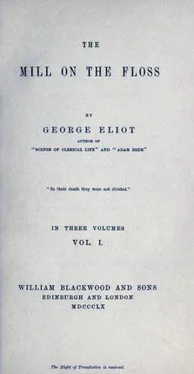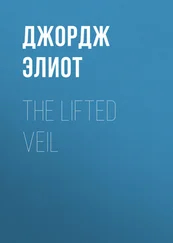Maggie's hair, as she threw off her bonnet, painfully confirmed her mother's accusation. Mrs. Tulliver, desiring her daughter to have a curled crop, "like other folks's children," had had it cut too short in front to be pushed behind the ears; and as it was usually straight an hour after it had been taken out of paper, Maggie was incessantly tossing her head to keep the dark, heavy locks out of her gleaming black eyes, — an action which gave her very much the air of a small Shetland pony.
"Oh, dear, oh, dear, Maggie, what are you thinkin' of, to throw your bonnet down there? Take it upstairs, there's a good gell, an' let your hair be brushed, an' put your other pinafore on, an' change your shoes, do, for shame; an' come an' go on with your patchwork, like a little lady."
"Oh, mother," said Maggie, in a vehemently cross tone, "I don't want to do my patchwork."
"What! not your pretty patchwork, to make a counterpane for your aunt Glegg?"
"It's foolish work," said Maggie, with a toss of her mane, — "tearing things to pieces to sew 'em together again. And I don't want to do anything for my aunt Glegg. I don't like her."
Exit Maggie, dragging her bonnet by the string, while Mr. Tulliver laughs audibly.
"I wonder at you, as you'll laugh at her, Mr. Tulliver," said the mother, with feeble fretfulness in her tone. "You encourage her i' naughtiness. An' her aunts will have it as it's me spoils her."
Mrs. Tulliver was what is called a good-tempered person, — never cried, when she was a baby, on any slighter ground than hunger and pins; and from the cradle upward had been healthy, fair, plump, and dull-witted; in short, the flower of her family for beauty and amiability. But milk and mildness are not the best things for keeping, and when they turn only a little sour, they may disagree with young stomachs seriously. I have often wondered whether those early Madonnas of Raphael, with the blond faces and somewhat stupid expression, kept their placidity undisturbed when their strong-limbed, strong-willed boys got a little too old to do without clothing. I think they must have been given to feeble remonstrance, getting more and more peevish as it became more and more ineffectual.
Chapter III. Mr. Riley Gives His Advice Concerning a School for Tom
The gentleman in the ample white cravat and shirt-frill, taking his brandy-and-water so pleasantly with his good friend Tulliver, is Mr. Riley, a gentleman with a waxen complexion and fat hands, rather highly educated for an auctioneer and appraiser, but large-hearted enough to show a great deal of bonhomie toward simple country acquaintances of hospitable habits. Mr. Riley spoke of such acquaintances kindly as "people of the old school."
The conversation had come to a pause. Mr. Tulliver, not without a particular reason, had abstained from a seventh recital of the cool retort by which Riley had shown himself too many for Dix, and how Wakem had had his comb cut for once in his life, now the business of the dam had been settled by arbitration, and how there never would have been any dispute at all about the height of water if everybody was what they should be, and Old Harry hadn't made the lawyers.
Mr. Tulliver was, on the whole, a man of safe traditional opinions; but on one or two points he had trusted to his unassisted intellect, and had arrived at several questionable conclusions; amongst the rest, that rats, weevils, and lawyers were created by Old Harry. Unhappily he had no one to tell him that this was rampant Manichæism, else he might have seen his error. But to-day it was clear that the good principle was triumphant: this affair of the water-power had been a tangled business somehow, for all it seemed — look at it one way — as plain as water's water; but, big a puzzle as it was, it hadn't got the better of Riley. Mr. Tulliver took his brandy-and-water a little stronger than usual, and, for a man who might be supposed to have a few hundreds lying idle at his banker's, was rather incautiously open in expressing his high estimate of his friend's business talents.
But the dam was a subject of conversation that would keep; it could always be taken up again at the same point, and exactly in the same condition; and there was another subject, as you know, on which Mr. Tulliver was in pressing want of Mr. Riley's advice. This was his particular reason for remaining silent for a short space after his last draught, and rubbing his knees in a meditative manner. He was not a man to make an abrupt transition. This was a puzzling world, as he often said, and if you drive your wagon in a hurry, you may light on an awkward corner. Mr. Riley, meanwhile, was not impatient. Why should he be? Even Hotspur, one would think, must have been patient in his slippers on a warm hearth, taking copious snuff, and sipping gratuitous brandy-and-water.
"There's a thing I've got i' my head," said Mr. Tulliver at last, in rather a lower tone than usual, as he turned his head and looked steadfastly at his companion.
"Ah!" said Mr. Riley, in a tone of mild interest. He was a man with heavy waxen eyelids and high-arched eyebrows, looking exactly the same under all circumstances. This immovability of face, and the habit of taking a pinch of snuff before he gave an answer, made him trebly oracular to Mr. Tulliver.
"It's a very particular thing," he went on; "it's about my boy Tom."
At the sound of this name, Maggie, who was seated on a low stool close by the fire, with a large book open on her lap, shook her heavy hair back and looked up eagerly. There were few sounds that roused Maggie when she was dreaming over her book, but Tom's name served as well as the shrillest whistle; in an instant she was on the watch, with gleaming eyes, like a Skye terrier suspecting mischief, or at all events determined to fly at any one who threatened it toward Tom.
"You see, I want to put him to a new school at Midsummer," said Mr. Tulliver; "he's comin' away from the 'cademy at Lady-day, an' I shall let him run loose for a quarter; but after that I want to send him to a downright good school, where they'll make a scholard of him."
"Well," said Mr. Riley, "there's no greater advantage you can give him than a good education. Not," he added, with polite significance, — "not that a man can't be an excellent miller and farmer, and a shrewd, sensible fellow into the bargain, without much help from the schoolmaster."
"I believe you," said Mr. Tulliver, winking, and turning his head on one side; "but that's where it is. I don't mean Tom to be a miller and farmer. I see no fun i' that. Why, if I made him a miller an' farmer, he'd be expectin' to take to the mill an' the land, an' a-hinting at me as it was time for me to lay by an' think o' my latter end. Nay, nay, I've seen enough o' that wi' sons. I'll never pull my coat off before I go to bed. I shall give Tom an eddication an' put him to a business, as he may make a nest for himself, an' not want to push me out o' mine. Pretty well if he gets it when I'm dead an' gone. I sha'n't be put off wi' spoon-meat afore I've lost my teeth."
This was evidently a point on which Mr. Tulliver felt strongly; and the impetus which had given unusual rapidity and emphasis to his speech showed itself still unexhausted for some minutes afterward in a defiant motion of the head from side to side, and an occasional "Nay, nay," like a subsiding growl.
These angry symptoms were keenly observed by Maggie, and cut her to the quick. Tom, it appeared, was supposed capable of turning his father out of doors, and of making the future in some way tragic by his wickedness. This was not to be borne; and Maggie jumped up from her stool, forgetting all about her heavy book, which fell with a bang within the fender, and going up between her father's knees, said, in a half-crying, half-indignant voice,–
Читать дальше












